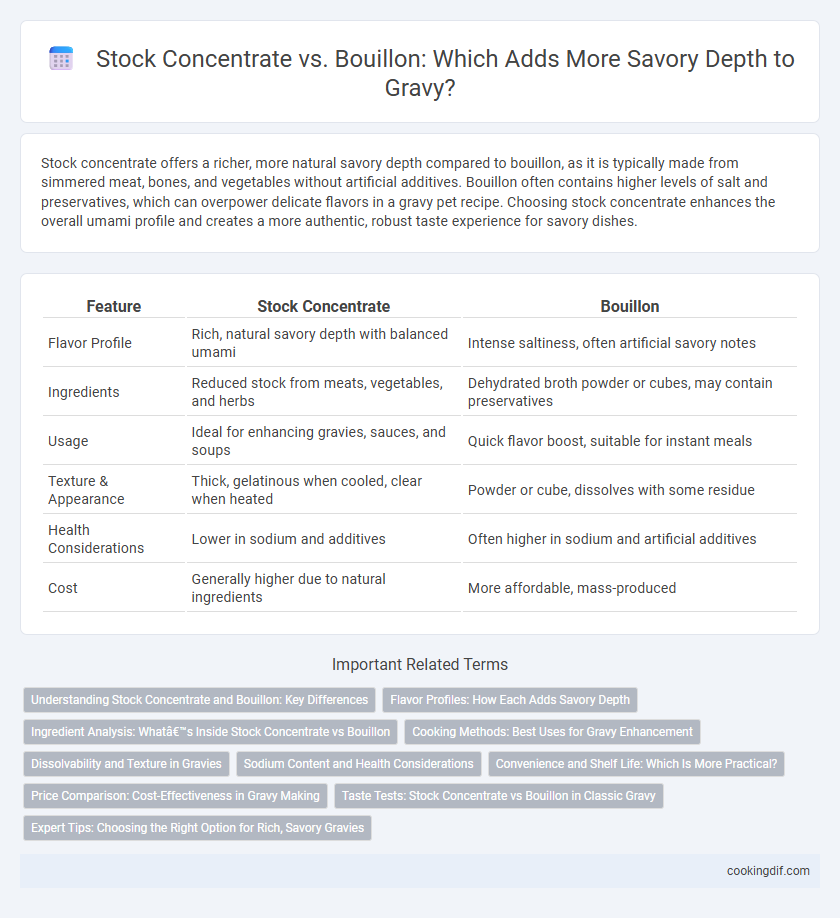Stock concentrate offers a richer, more natural savory depth compared to bouillon, as it is typically made from simmered meat, bones, and vegetables without artificial additives. Bouillon often contains higher levels of salt and preservatives, which can overpower delicate flavors in a gravy pet recipe. Choosing stock concentrate enhances the overall umami profile and creates a more authentic, robust taste experience for savory dishes.
Table of Comparison
| Feature | Stock Concentrate | Bouillon |
|---|---|---|
| Flavor Profile | Rich, natural savory depth with balanced umami | Intense saltiness, often artificial savory notes |
| Ingredients | Reduced stock from meats, vegetables, and herbs | Dehydrated broth powder or cubes, may contain preservatives |
| Usage | Ideal for enhancing gravies, sauces, and soups | Quick flavor boost, suitable for instant meals |
| Texture & Appearance | Thick, gelatinous when cooled, clear when heated | Powder or cube, dissolves with some residue |
| Health Considerations | Lower in sodium and additives | Often higher in sodium and artificial additives |
| Cost | Generally higher due to natural ingredients | More affordable, mass-produced |
Understanding Stock Concentrate and Bouillon: Key Differences
Stock concentrate provides a rich, gelatinous base derived from simmering bones, vegetables, and herbs, offering deep savory complexity ideal for enhancing gravies. Bouillon, typically available in cube or powder form, delivers quick seasoning with concentrated flavor but lacks the full-bodied texture and mouthfeel of stock concentrate. Understanding these differences allows chefs to select the appropriate ingredient that best amplifies umami and depth in savory dishes.
Flavor Profiles: How Each Adds Savory Depth
Stock concentrate delivers a rich, layered flavor with natural meat and vegetable extracts that deepen the savory complexity of gravy. Bouillon cubes offer a more intense, salty punch but often contain additives that can alter the purity of the flavor profile. Both enhance savory depth, yet stock concentrate provides a smoother, more nuanced base, while bouillon imparts a sharper, more immediate umami boost.
Ingredient Analysis: What’s Inside Stock Concentrate vs Bouillon
Stock concentrate typically contains concentrated meat, vegetable extracts, natural flavors, and gelatin, offering rich umami depth ideal for gravies. Bouillon cubes usually include salt, dehydrated vegetables, MSG, and preservatives, providing a quick but saltier flavor base. The higher protein and gelatin content in stock concentrate enhances savory mouthfeel, while bouillon often sacrifices complexity for convenience and shelf stability.
Cooking Methods: Best Uses for Gravy Enhancement
Stock concentrate delivers richer, more complex flavors for gravy due to its simmered extraction of meat, vegetables, and herbs, making it ideal for slow-cooked gravies and sauces requiring depth. Bouillon, often saltier and more processed, suits quick preparation and convenience but may lack the nuanced taste needed for gourmet gravies. Using stock concentrate in braising or roasting enhances savory depth, while bouillon works best in simple, fast gravies or as a seasoning base.
Dissolvability and Texture in Gravies
Stock concentrate offers superior dissolvability in gravies, creating a smooth, rich texture that enhances savory depth without graininess. Bouillon cubes often contain fillers that may not fully dissolve, resulting in a slightly gritty texture and uneven flavor distribution. Using stock concentrate ensures a more consistent, velvety gravy with intense umami and well-rounded savory notes.
Sodium Content and Health Considerations
Stock concentrate typically offers a richer savory depth with lower sodium levels compared to bouillon, which often contains higher salt content and additives. Health considerations favor stock concentrate for those monitoring sodium intake, as excessive sodium from bouillon can contribute to hypertension and cardiovascular risks. Choosing stock concentrate enhances flavor while supporting a balanced diet due to its cleaner ingredient profile and reduced sodium concentration.
Convenience and Shelf Life: Which Is More Practical?
Stock concentrate offers a richer and more authentic savory depth compared to bouillon, making it ideal for gravies requiring robust flavor. It typically comes in liquid or paste form, providing convenience with quicker dissolution and less salt content, which allows better control over seasoning. Stock concentrate also boasts a longer shelf life without compromising on taste, making it a practical choice for cooks seeking both quality and ease of storage.
Price Comparison: Cost-Effectiveness in Gravy Making
Stock concentrate offers a more cost-effective option for enhancing the savory depth of gravy compared to bouillon, providing richer flavors at a lower price per serving. Bouillon cubes, while convenient, often have higher sodium content and less intense flavor, requiring more quantity to achieve the same taste, increasing overall cost. Investing in stock concentrate can reduce expenses while delivering a robust, savory profile essential for premium gravy.
Taste Tests: Stock Concentrate vs Bouillon in Classic Gravy
Stock concentrate delivers a richer, more complex umami flavor compared to bouillon, which can sometimes taste overly salty or artificial in classic gravy recipes. Taste tests consistently reveal that gravies made with stock concentrate have a deeper savory profile and smoother mouthfeel, enhancing the overall dining experience. Choosing stock concentrate over bouillon results in a more authentic and satisfying gravy.
Expert Tips: Choosing the Right Option for Rich, Savory Gravies
Stock concentrate offers a richer, more natural depth of flavor in gravies due to its slow-simmered ingredients and higher gelatin content, enhancing mouthfeel and complexity. Bouillon cubes or powders provide convenience and consistency but often contain higher sodium and artificial additives, which can affect the purity of savory notes. Expert chefs recommend using stock concentrate for gravies that require authentic, layered taste while reserving bouillon for quick, last-minute preparations.
Stock concentrate vs bouillon for savory depth Infographic

 cookingdif.com
cookingdif.com